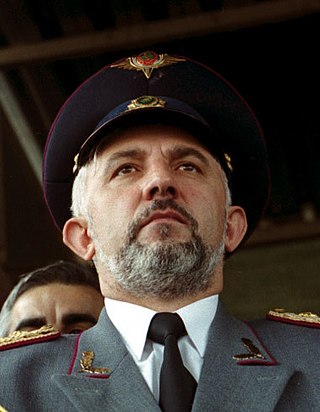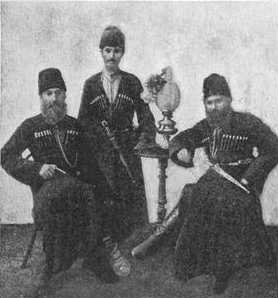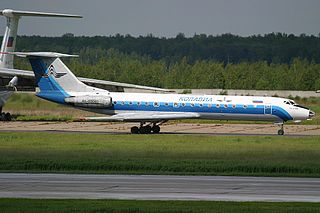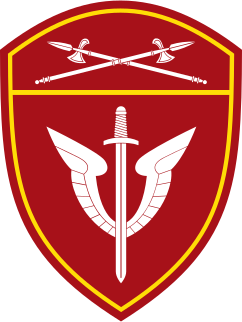
Chechnya, officially the Chechen Republic, is a constituent republic of Russia situated in the North Caucasus in Eastern Europe, close to the Caspian Sea. The republic forms a part of Russia's North Caucasian Federal District, and shares land borders with the country of Georgia to its south; with the Russian republics of Dagestan, Ingushetia, and North Ossetia-Alania to its east, north, and west; and with Stavropol Krai to its northwest.

Grozny is the capital city of Chechnya, Russia. The city lies on the Sunzha River. According to the 2010 census, it had a population of 271,573 – up from 210,720 recorded in the 2002 census, but still only about two-thirds of 399,688 recorded in the 1989 census. It was previously known as Groznaya.

The Second Chechen War was an armed conflict in Chechnya and the border regions of the North Caucasus between the Russian Federation and the Chechen Republic of Ichkeria, fought from August 1999 to April 2009.

Aslan (Khalid) Aliyevich Maskhadov was a politician who served as the third President of the unrecognized Chechen Republic of Ichkeria.

Shamil Salmanovich Basayev was a senior leader of the Chechen independence movement and terrorist.

Zelimkhan Abdulmuslimovich Yandarbiyev was a writer and a politician, who served as acting president of the breakaway Chechen Republic of Ichkeria between 1996 and 1997. In 2004 Yandarbiyev was assassinated while in exile in Qatar.

Mountain Jews or Caucasus Jews also known as Juhuro,Juvuro,Juhuri,Juwuri, Juhurim,Kavkazi Jews or Gorsky Jews are Jews of the eastern and northern Caucasus, mainly Azerbaijan, and various republics in the Russian Federation: Chechnya, Ingushetia, Dagestan, Karachay-Cherkessia, and Kabardino-Balkaria. They are the descendants of Persian Jews from Iran. The Mountain Jews took shape as a community after Qajar Iran ceded the areas in which they lived to the Russian Empire as part of the Treaty of Gulistan of 1813.
The Chechens, historically also known as Kisti and Durdzuks, are a Northeast Caucasian ethnic group of the Nakh peoples native to the North Caucasus in Eastern Europe. They refer to themselves as Nokhchiy. Chechen and Ingush peoples are collectively known as the Vainakh since the 1930s and were known as Nakhchi prior. The vast majority of Chechens today are Muslims and live in Chechnya, a republic of Russia.

Ramzan Akhmadovich Kadyrov is a Chechen politician currently serving as the Head of the Chechen Republic. He was a former member of the Chechen independence movement.

Dzhokhar Musayevich Dudayev was a Soviet Air Force general and Chechen secularist leader, the first President of the Chechen Republic of Ichkeria, a breakaway region in the North Caucasus, from 1991 to his death in 1996.

On the night of 24 August 2004, explosive devices were detonated on board two domestic passenger flights that had taken off from Domodedovo International Airport in Moscow, Russia, causing the destruction of both aircraft and the loss of all 90 people on board them.

OMON is a system of special police units within the National Guard of Russia. It previously operated within the structures of the Soviet and Russian Ministries of Internal Affairs (MVD). Originating as the special forces unit of the Soviet Militsiya in 1988, it played major roles in several armed conflicts during and following the 1991 dissolution of the Soviet Union.

The Budyonnovsk hospital hostage crisis took place from 14 to 19 June 1995, when a group of 80 to 200 Chechen separatists led by Shamil Basayev attacked the southern Russian city of Budyonnovsk, some 110 kilometres (70 mi) north of the border with the de facto independent Chechen Republic of Ichkeria. The attack resulted in a ceasefire between Russia and Chechen separatists, and peace talks between Russia and the Chechens.

Anna Stepanovna Politkovskaya was a Russian journalist, writer, and human rights activist who reported on political events in Russia, in particular, the Second Chechen War (1999–2005).

The War of Dagestan, also known as the Invasion of Militants in Dagestan began when the Chechnya-based Islamic International Peacekeeping Brigade (IIPB), an Islamist group, led by warlords Shamil Basayev, Ibn al-Khattab, Ramzan Akhmadov and Arbi Barayev invaded the neighboring Russian republic of Dagestan, on 7 August 1999, in support of the Shura of Dagestan separatist rebels. The war ended with a major victory for the Russian Federation and Dagestan Republic, and the retreat of the IIPB. The invasion of Dagestan served as the main casus belli alongside the series of apartment bombings in September 1999 for the Second Chechen War.
The article details notable human rights violations committed by the warring sides during the second war in Chechnya. Both Russian officials and Chechen rebels have been regularly and repeatedly accused of committing various war crimes, including kidnapping, torture, murder, hostage taking, looting, rape, beheading and assorted other breaches of the law of war.

Prisoner of the Mountains, also known as Prisoner of the Caucasus, is a 1996 Russian war drama film directed by Sergei Bodrov and written by Bodrov, Arif Aliyev and Boris Giller. The film is based on the 1872 Caucasian War-era short story "The Prisoner in the Caucasus" by the classic Russian writer Leo Tolstoy.

The February 2004 Moscow metro bombing occurred on 6 February 2004 when a male suicide bomber killed 41 people near Avtozavodskaya subway station on the Zamoskvoretskaya Line in Moscow. Up to 120 people were injured in the incident, some of the more common injuries being broken bones and smoke inhalation.
Musa Bautdinovich Geshaev was a Chechen poet, literary critic, songwriter, and historian who wrote extensively on the culture of the Chechen and Ingush people.
Musa Muradov is an ethnic Chechen Russian journalist. In 2003, he was awarded the International Press Freedom Award of the Committee to Protect Journalists for his reporting on the Second Chechen War.















